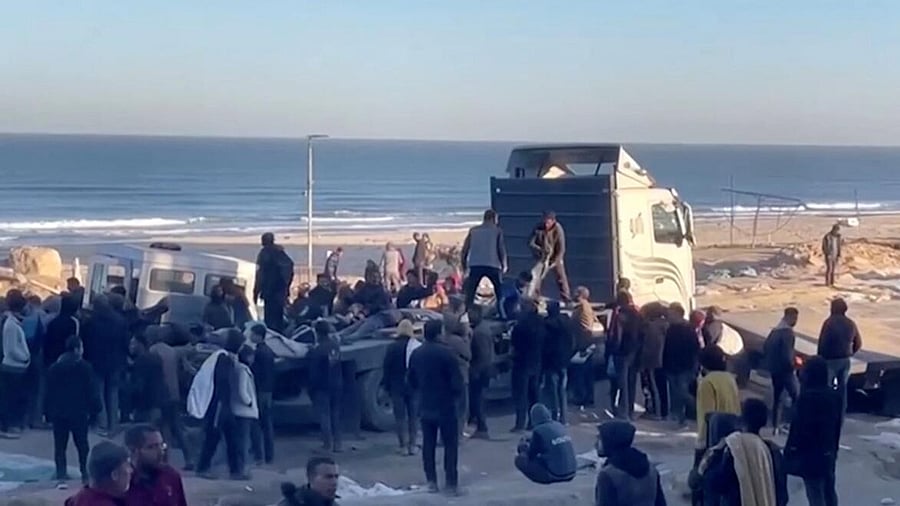
Palestinians transport casualties following what Palestinian health officials said was Israeli fire on people waiting for aid, in Gaza City.
Credit: Reuters Photo
United Nations/Geneva: Voicing grave concern over the situation in Palestine, India on Thursday said there is an immediate need for a sustainable humanitarian corridor to provide relief and underlined that the conflict must not spread within, or beyond the region.
In a statement during the 55th Session of the Human Rights Council at the Interactive Dialogue following the High Commissioner’s report on the Humanitarian Situation in the Occupied Palestinian Territory, India’s Permanent Representative to the UN in Geneva Ambassador Arindam Bagchi underlined the need to be clear about the universal obligation to observe International Humanitarian Law.
“The situation in Palestine continues to be of grave concern, with large-scale loss of civilian lives, especially women and children, and an alarming humanitarian crisis. This is clearly unacceptable and we strongly condemn the death of all civilians,” Bagchi said.
“Further, there is an immediate need for a sustainable humanitarian corridor to provide relief. The conflict must not spread within, or beyond the region,” he said.
India emphasised that a two-state solution to the Israel-Palestine conflict is necessary more than ever before.
“These are not choices, these are all musts and unless we are able to address all of them, we are not going to really solve the problem,” Bagchi said.
He also asserted that “we must be clear that terrorism and hostage-taking are unacceptable and deserve our unequivocal condemnation. India has a zero-tolerance approach to terrorism. The return of hostages is imperative.” India, on its part, will continue to support the Palestinian people through the bilateral development partnership and will also continue to send humanitarian assistance to the people of Palestine, he added.
In his statement, UN High Commissioner for Human Rights Volker Turk told the session that the present report on the situation “makes for very painful reading.”
“There appear to be no bounds to – no words to capture – the horrors that are unfolding before our eyes in Gaza. Since early October, over 100,000 people have been killed or wounded,” Turk said.
He said the attacks on Israeli civilians on October 7 and 8 last year were shocking, profoundly traumatising and totally unjustifiable.
“The killing of civilians, reports of torture and sexual violence inflicted by Hamas and other Palestinian armed groups, and the holding of hostages since that time, are appalling and entirely wrong,” he said.
The UN human rights chief added: “And so is the brutality of the Israeli response; the unprecedented level of killing and maiming of civilians in Gaza, including UN staff and journalists; the catastrophic humanitarian crisis caused by restrictions on humanitarian aid; the displacement of at least three-quarters of the population, often multiple times; the massive destruction of hospitals and other civilian infrastructure – and in many cases, systematic demolition of entire neighbourhoods, rendering Gaza largely unliveable.”
He noted that between October 8 and 21, 2023 in the aftermath of the October 7 Hamas attacks, Israel imposed a complete ban on all supply of aid, food, fuel and electricity to Gaza. Since then, Israel has continued to hinder humanitarian assistance.
“All people in Gaza are at imminent risk of famine. Almost all are drinking salty and contaminated water. Healthcare across the territory is barely functioning. Just imagine what this means for the wounded, and people suffering infectious disease outbreaks,” he said.
He noted that in northern Gaza, where the operational space for humanitarian work is now almost zero, many are already believed to be starving. In all other parts of Gaza, humanitarian assistance has become extremely challenging – and this is not only dangerous but also dehumanising.
“The blockade and siege imposed on Gaza amount to collective punishment, and may also amount to the use of starvation as a method of war – both of which, committed intentionally, are war crimes,” the top UN human rights official said.
Turk said that since October 7, more than 7,000 Palestinians in the occupied West Bank have been arbitrarily detained. About 9,000 are currently being held as 'security prisoners', over 3,400 of them in administrative detention without charge or prospect of a trial; and at least 606 are being held incommunicado.
He said the international community must hold on to the promise that peace is achievable in the Occupied Palestinian Territory and Israel. “For that to work, the occupation must end. Israeli leaders must accept the right of Palestinians to live in an independent state. And all Palestinian factions must accept the right of Israel to exist in peace and security,” he said.